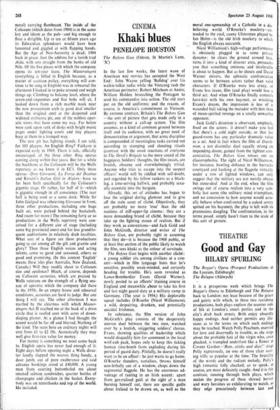CINEMA
Khaki blues
PENELOPE HOUSTON
In the last few weeks, the latest wave of American war movies has occupied the West End : John Wayne yelling 'Bulldog' over his walkie-talkie radio while the Vietcong rush the American perimeter; Robert Mitchum at Anzio; William Holden beseeching the Pentagon to send his commandos into action. The old stars put on the old uniforms; and the reason, of course, is America's commitment in Vietnam. By extreme contrast, Britain's The Bofors Gun —the sort of picture that gets made only in a country without a call-up system. The film assumes, as a kind of common ground between itself and its audience, with no great need of demonstration or argument, that army discipline is compounded of meaningless tasks carried out according to stamping and shouting rituals (contrast with the awed reactions of everyone in The Devil's Brigade to the mere sound of the bagpipes). Soldiers' thoughts, the film insists, are brutish, obscene and overwhelmingly trivial. Anyone who tries to escape into the suspect officers' world will be riddled with self-doubt, and regarded by his fellow rankers as a black- leg, a time-serving halfwit, and probably sexu- ally eccentric into the bargain.
Already, this set of • attitudes has begun to lose the original daring glamour and to give off the stale scent of cliché. Objectively, they are probably no more 'true' than the old routines of stiff-upper-lip cinema : they are a more demanding brand of cliché, because they take up the fighting stance of realism. But if they work as conventions—and Jack Gold and John McGrath, director and writer of The Bofors Gun, are probably right in assuming that they do—it is because the 1968 public, or at least that section of the public likely to watch the film, sees khaki as the colour of servitude.
The Bofors Gun begins with another cliché: a young soldier sits among civilians at a con- cert—which in film language hints that he's sensitive, possibly weak-minded; and certainly heading for trouble. He's soon revealed as Lance-Bombardier Evans (David Warner), newly posted to an officers' training course in England and meanwhile about to take his first and last night guard duty at a military camp in Germany. (The year is l'954.) His deplorable squad includes O'Rourke (Nicol Williamson), a wild, despairing, drunken, and potentially suicidal Irishman.
In substance, the 'film version of John McGrath's play consists of the desperately uneven duel between the two men, watched over by a loutish, sniggering soldiers' chorus. Evans, showing qualities of leadership which would disqualify him for command in the local wolf-cub pack, hopes only to keep this ticking human time-bomb from exploding during his period of guard duty. Pitifully, he doesn't really want to be an officer : he just wants to go home. O'Rourke thunders, tantalises, throws himself non-lethally out of a window, chops down the regimental flagpole. He has the enormous ad- vantage of ranting in an Irish accent: apart from generalised guilt at the sight of a man burning himself out, there are specific guilts about Ireland to be drawn on, as well as the
moral one-upmanship of a Catholic in a dis- believing world. O'Rourke's mockery—ex. tended to the cool, canny Ulsterman played by Ian Holm—is the old Irish mockery to which the English always succumb.
Nicol Williamson's high-voltage performance is obviously plugged in to some private dynamo: he clears the ground around him, turns it into a kind of disaster area, persuades you that something ominous and intolerable is about to happen. But as he shouts and David Warner shivers, the splenetic confrontation seems to be between actors rather than valid characters. If O'Rourke were less crazy, or Evans less inane, film (and play) would lose a third act. And when O'Rourke finally commits hara-kiri with his own bayonet, so wrecking Evans's dream, the • impression is less of a wounded bull taking the matador with him than of mean-spirited revenge on a totally unworthy opponent.
Jack Gold's direction is observant, emphatic, fixed on the actors: it doesn't make you feel that there's a cold night outside, or that the guard-room has any particular dramatic value as a set. And in fact where the film of Dutch- man, a not dissimilar duel equally strong on impending doom, gained from the tightest con- centration, The Bofors Gun misses out on claustrophobia. The sight of Nicol Williamson, for instance, bawling defiance in the barracks courtyard and hacking at the flagpole virtually under a row of lighted windows, can only suggest that the military are not merely obtuse but stone-deaf. And at the end, when the film swings out of coarse realism into a very sym- bolic last scene (the military mind triumphant, and no concession to how anyone would actu- ally behave when confronted by a naked sentry spitted on his bayonet), the play is' left with its pretensions dangling. The confrontation, in the terms posed, simply hasn't risen to the scale of this sort of gesture.


































 Previous page
Previous page